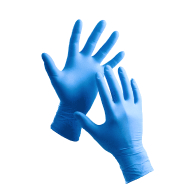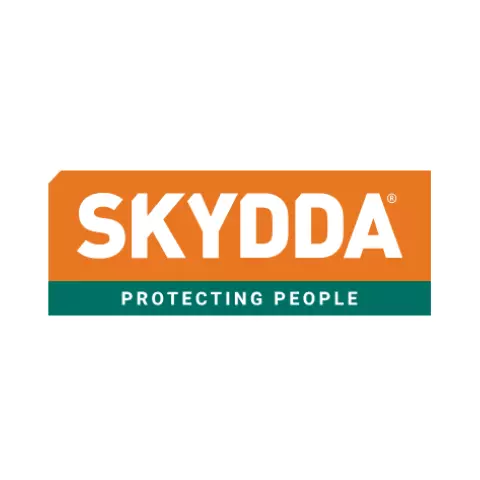Guide Disposable Glove
Skydda
visit storeProduct description
Disposable nitrile gloves improve protection against hazardous chemicals. Anti-static properties for environments where there is a risk of static electricity discharge. Textured surface for improved grip. Liquid-proof and powder-free construction. Chlorinated interior for easy donning and doffing. Approved for contact with all types of food. Type B chemical protection. Microbiological and viral protection. Waterproof and oil resistant. Antistatic. Textured surface for improved grip. Powder-free construction. Approved for direct contact with food. Extra-long handrail for increased safety.
Describes whether fingertips have a smooth or textured surface, affecting grip strength, tactile sensitivity, and handling precision for various applications.
Indicates the glove's pigmentation, which can aid in color-coding tasks, enhancing visibility, or meeting specific industry requirements for contamination control.
Indicates the composition of the gloves, affecting properties like elasticity, chemical resistance, allergen potential, and suitability for specific tasks.
Indicates the statistical quality inspection standard measuring defect rates. Lower AQL values (e.g., 0.65) signify fewer defects and higher protection reliability.
Indicates whether gloves contain donning powder. Powder-free options reduce allergen risks and contamination, while powdered versions offer easier application.
Offers versatile hand protection for various tasks. Balances durability and flexibility, suitable for diverse applications requiring barrier protection.
Offers complete hand coverage, ensuring hygiene and protection. Ideal for various tasks requiring a barrier against contamination and maintaining cleanliness.
- Electrical Protection
- Water Resistance
- Antimicrobial Protection
- Machine Washable
Request a free sample
Test first and buy later. Visit any product page to request your free sample.
Standards and labels
EN ISO 374-1:2016 is a standard that defines the performance requirements for gloves that protect against chemicals and microorganisms. The standard specifies the design, materials, and testing requirements for gloves to protect against chemicals and microorganisms. Possible test results include measurements of the gloves' permeation resistance, degradation, and penetration. It also includes the safety and functionality requirements for gloves.
Test results
Specified Requirements Type BEN 374-5:2016 is a European standard for gloves that protect against microorganisms, specifically gloves that are used for medical and dental procedures. It sets rules for how the gloves should protect against microorganisms and how to test if they meet the standards. Gloves that pass the tests can have a label that says they meet the standard. The test results can be pass or fail for each test that checks the gloves resistance to microorganisms.
Test results
Micro-organisms VirusEN 374-5:2016 is a standard that outlines the requirements and testing methods for protective gloves designed to protect against viruses. The designation 'Virus' indicates that the gloves have passed specific tests confirming their barrier effectiveness against viruses. These tests involve assessing the glove material's resistance to penetration by blood-borne pathogens and other virus-containing fluids, using a bacteriophage as a surrogate virus due to its small size and resistance. Gloves that meet this standard are vital in healthcare settings, laboratories, and any environment where there is a risk of exposure to viral infections. They are crucial for preventing the transmission of diseases, ensuring that workers are protected when handling potentially infectious materials, thus enhancing safety and health protocols in workplaces with biological hazards.
Micro-organisms Bacteria & FungiEN 374-5:2016 specifies the requirements and test methods for protective gloves intended to protect against bacteria and fungi. The designation 'Bacteria & Fungi' indicates that the gloves have been tested and verified to provide effective barrier protection against microbial agents. The testing involves evaluating the glove's material and seams for their impermeability to microorganisms under conditions that simulate real-world use, ensuring no penetration occurs through the glove material or at the seams. Gloves certified under this standard are crucial for use in environments such as healthcare, laboratory settings, and any applications where preventing the transmission of infectious agents is essential. They help ensure the safety and hygiene of workers by providing reliable protection against the risks of bacterial and fungal contamination.
Food safe refers to the safety of food products that are used or consumed by people. In Europe, food safety is regulated by the European Union (EU) and the European Food Safety Authority (EFSA). These organizations set standards and requirements for food products to ensure they are safe to eat. To be considered "food safe" in Europe, a product must meet these standards and be free of harmful substances. This includes being free of harmful bacteria, pesticides, and other contaminants. Food products that do not meet these standards cannot be sold or used in the EU.
Skydda delivery terms
Free delivery for all Skydda products
246,81 €
Price per 10 packages (500 pcs)
49,36 € / 100 pcs
Free delivery
A carton contains 10 packages (500 pieces)
Need larger quantities?
Other products you may like
Recently viewed
Need help?
Get help from our experts
Other products you may like
Similar products you may like
Skydda
Delivery time: 3 business days
Supplier shipping fee 6,33 €
Free shipping on orders over 150,00 €



Find +150,000 products from hundreds of brands
Autonomous sourcing platform
The most efficient way to source and order supplies for your operations
Sourcing
Ordering
List products you’re looking for and we’ll find the best products and prices for you – all for free.
Need help?
Get help from our experts
